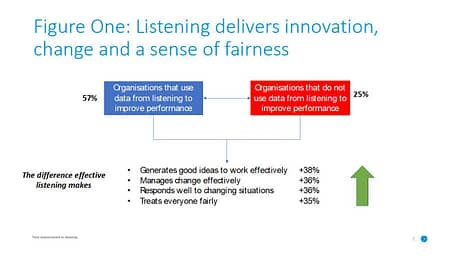A recently published global survey explores how organisations listen to their employees and the impact of employee voice on work performance. It reveals strong associations between effective listening and key organisational outcomes.
Here are 5 top highlights from the report:
- There is a robust link between how well organisations listen to their employees and how well they manage innovation in ways of working, change, and the creation of a sense of fairness. 57% of organisations say they use the data from listening to improve performance, but one in four say they do not. Critically, those who listen to improve performance show significant differences in their ability to generate good ideas to work effectively (38% more positive), manage change effectively (36% more positive) and treat everyone fairly (35% more positive) – see figure above.
- Leaders are significantly more important than line managers when it comes to delivering outcomes from listening. The research asked participants to evaluate how responsive managers were, and how responsive leaders were, to their employees views. It found a much stronger association between leaders’ (vs line managers) responsiveness and key outcomes like fairness, caring about diversity, and the management of change.
- Surveys are by far the most dominant tool for listening while numerous other valuable approaches are used much more sporadically. 59% of organisations still use a large-scale employee survey on an annual basis and consider surveys the most insightful listening tools. Qualitative methods like interviews and focus groups (face to face or online) are rarely used.
- Digital listening in particular appears overlooked and under-utilised. Although 53% of respondents thought employees are more comfortable in speaking out on digital platforms, only 26% thought managers were comfortable listening via digital platforms. In addition, 58% of organisations never or rarely monitor discussions on digital platforms as a listening method.
- Organisations think they listen better than they do. More than 70% of respondents agree that their organisations take employee views seriously, have open mindsets when listening and are willing to listen. And yet, when responding to practical questions like planning to listen, ensuring leaders listen, and responding to feedback, the responses fall well below 50%.
A copy of the 30 page report based on input from 550 organisations globally and which provides detailed analysis and commentary on these and many other insights is available here. These findings build on other blogs and commentary on the EFS website such as the East Midlands special session on employee voice which also features links to recent CIPD research on voice.
The research was conducted between September to December 2020 – just before the third lockdown in the UK – and the findings reflect experiences people had during the pandemic. It was co-authored by Mike Pounsford (founder of change and communication consultancy Couravel), Howard Krais (Communications Director at Johnson Matthey), and Dr. Kevin Ruck (co-founder of training company PR Academy).
It is their third report on Listening. The first report in 2019 explored Listening definitions, benefits and barriers. The second report in 2020 highlighted global good practices and Listening Tools. The team aims to promote listening to employees as an under-valued element in the communications mix, to challenge organisations to listen more and to provide practical tips and advice on how to listen well.
They are planning more research – via online focus groups which will capture and share good practices – later in 2021. Members of the EFS movement would be welcome to participate and can find out more by getting in touch with anyone from the team via email:
Mike Pounsford-mikep@couravel.com; Howard Krais-howardkrais@gmail.com; Kevin Ruck-Kevin.Ruck@pracademy.co.uk
Author bio: Mike Pounsford, Founder of change and communication consultancy Couravel
Photo credit: Brett Jordan on Unsplash




